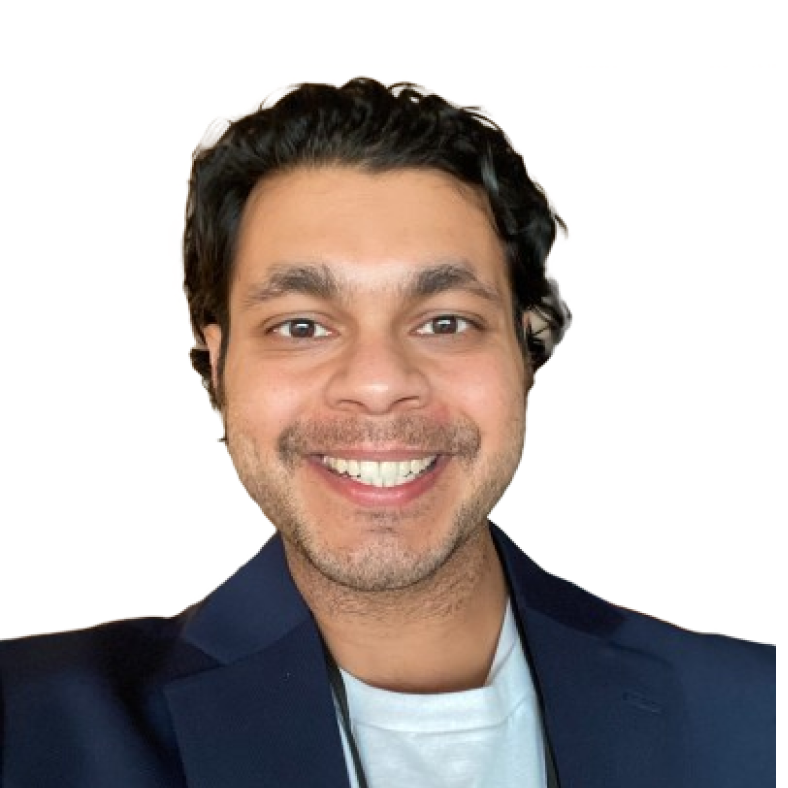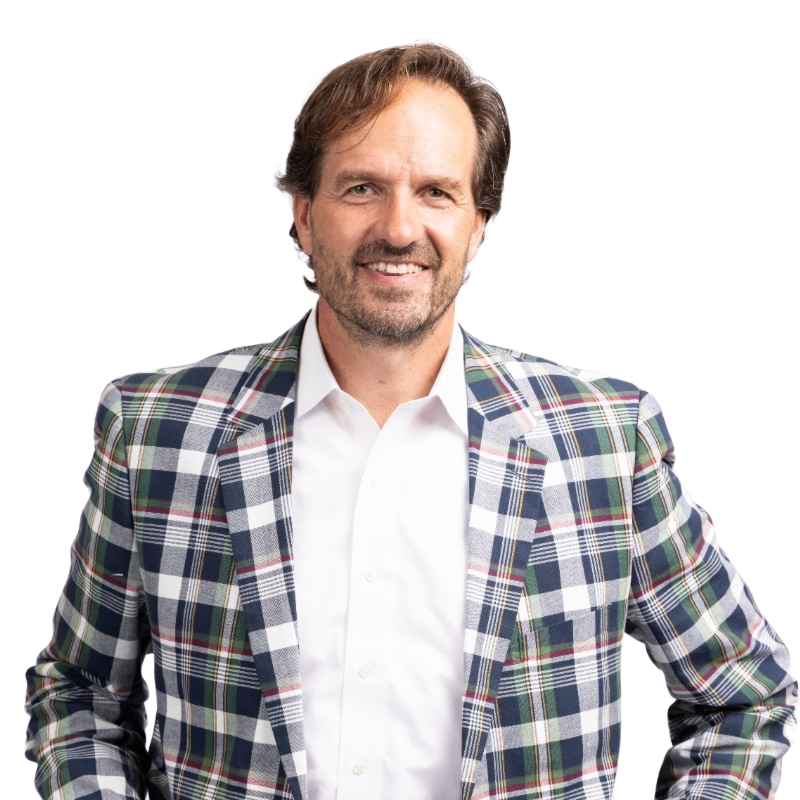
BACK TO PODCASTS
Will Allred
Cofounder
|
Lavender
Episode #
28
In this episode of Path to Growth, host Tracy Young sits down with Will Allred, co-founder and self-described “not really” COO of Lavender.ai.

In this episode of Path to Growth, host Tracy Young sits down with Will Allred, co-founder and self-described “not really” COO of Lavender.ai. Will shares the company’s origin story—how a failed startup pivot during the early days of COVID turned into a successful sales email copilot powered by psychology. He discusses the mindset that keeps him pushing forward (“just keep kicking”), the importance of acting with urgency, and why consistent prospecting is the lifeblood of any early-stage startup. Will also opens up about building a lean, high-agency team and the kind of culture that scales well with few resources.
The conversation dives into Will’s approach to growth via social media, including his daily habit of writing LinkedIn posts as a form of journaling. Tracy and Will trade practical advice on closing deals, managing early sales cycles, disqualifying the wrong customers, and optimizing productivity—right down to scheduling tasks directly into a calendar. Along the way, they highlight the value of mentorship, share lessons from the pandemic, and celebrate the creative instincts (like Lavender’s famous claymation wizard) that help small teams stand out.
Podcast Transcript
[00:00:00] Will Allred: He has this analogy of two mice falling into a bucket of milk, and there's two things that happen. One mouse just gets tired, gives off drowns the other mouse continues to work until that milk turns into butter and the mouse walks out. That's really my core ethos is just when the water gets choppy, just kick harder.
[00:00:30] Tracy Young: Hi, welcome to Path to Growth. I'm Tracy Young, co-founder and CEO of Tiger Eye. Today we are joined by Will Allred, co-founder and CO of lavender.ai will welcome. Thank you for having me. Good to be here. So to start, tell me about growing up. Tell me about what you learned from mom and dad.
[00:00:50] Will Allred: That's a good question.
[00:00:52] So grew up in. I feel like this is more common than ever a household of split parents, but parents who nonetheless, were still more than friendly and spend time with both throughout my childhood my mom big four, consulting her whole career, and my dad corporate m and a law.
[00:01:14] So two folks that I've learned a ton from when it comes to the things that I do at work and lessons of really hard work, I. I joke that like my dad still works harder than me approaching retirement at this point.
[00:01:29] Tracy Young: Yeah. My parents were that way too. They were working like they couldn't pay next month's rent.
[00:01:33] And it's like you guys have been doing a really good job saving and bring yourselves into the middle class in the last 40 years. Like you can take a break. Anyways, tell me about lavender and why this problem is important to you.
[00:01:47] Will Allred: It's interesting. Lavender came about in the midst of a COVID pivot.
[00:01:51] So my co-founder and I met Will, my other co-founder at a hackathon in Atlanta back in 2018. The idea was a MarTech startup focused on personalizing digital experiences around psychological preferences of the person on the other end, right? So like introverts versus extroverts, an introvert might prefer.
[00:02:15] Cooler blue or hues. Whereas an extrovert might like brighter colors and more people making direct eye contact and photographs. We worked on that problem for. Two years alongside my other co-founder, Casey, and yeah, in that brought on some amazing customers like Yamaha, gravity, blankets. Most of our revenue though, was coming from the world of coworking.
[00:02:39] Folks wanted to engage with their members aligned with like their own personality traits. COVID rolls around, not many people are going to coworking spaces, and so we had 45 days of runway and had to figure out what was next. And. Yeah, I was fortunate. We were all up in New York City together at the time, brainstorming and came up with this concept for lavender.
[00:03:01] We saw communication moving really strongly into a digital format, and we had a lot of the building blocks in place to help people communicate more effectively and more thoughtfully. And so that's really how we came about now as we've continued to build in that arena. We've built this massive intelligence layer on email, really the lens of what buyers prefer since the lens of psychology is how we're always applying it.
[00:03:35] And so we're really establishing this system of record for email-based communication, and that comes to life today through a copilot that folks use as they're writing sales emails. So we've found. The most success and the most opportunity to help folks in the workspace, particularly in cold prospecting, cold outbound.
[00:04:00] Tracy Young: From a business perspective, what's your hardest problems today and how are you tackling those
[00:04:05] Will Allred: from a business perspective, I would say the hardest thing is always boil down to making sure you have the product experience correctly, and then communicating that externally as well as possible. So I look at.
[00:04:18] Yeah the core challenges that we face as more around reinforcing the value that we drive for folks. And so yeah I've gotten super hands-on within our go-to market work to understand how we're delivering that value, how we're talking about that value with teams. I would say that's like the big challenge that's taking up my mental energy.
[00:04:40] Tracy Young: When you're recruiting teammates who what are the characteristics that you look for? What's the type of culture that you guys are trying to build over@lavender.ai?
[00:04:50] Will Allred: We're a really lean team. I don't think most folks realize that. I think the social media brand that we've been able to fortunately create gives us a larger persona than what we actually are.
[00:05:02] But at the same time, we've been able to scale really fast with few heads thanks to our PLG roots, and so with a lean team. One of the, pretty much the thing that you have to look for in people is a sense for agency. So yeah, you think about having 15 people serving over 35,000 monthly active users like you, you have to be somebody who sees problems, takes them on, and is really only bringing it to the fold when there's blockers or challenges and is sharing outcomes on the other side.
[00:05:40] I've found that is probably the most important thing in like working with folks for the long term. The other things would be obvious making sure they take feedback well. And then I'd probably say like on the, not necessarily third as far as most important, but on another level is just.
[00:06:03] We're nice people. And so but nobody really wants to work with people that aren't nice people. And so we, we take that to heart in understanding people's core motivations as well as just a general sense of we, we refer to it internally as give back mentality and it's something we actually screen for when we interview.
[00:06:27] Tracy Young: So what are the questions you ask or how do you look for that when as you're screening for those characteristics?
[00:06:33] Will Allred: Yeah. So every conversation could be different, right? But we're looking for examples where folks unasked unprovoked are showcasing that agency, showcasing their ability to solve problems, but also showcasing a desire to give or be curious and learn without the expectation of something on the other end.
[00:06:57] An intrinsic motivation that's hard to come by.
[00:07:01] Tracy Young: COO what are your most important responsibilities that you have to the team and the company?
[00:07:07] Will Allred: Yeah. COO is a funny title, right? Especially like a 15 person company. So it's interesting in a lot of ways, I am, I. The world's worst COO because I'm not really a COO, it's entitled only where Elliot on our team manages and hosts all things operations where my focus is really all things go to market.
[00:07:29] And so core responsibilities falls under leading the sales team, helping make sure our customers have success. And yeah, I post on like social media and stuff, that's our biggest core source of marketing growth.
[00:07:44] Tracy Young: So you're basically C-R-O-C-M-O and everything in between it.
[00:07:51] Yeah I
[00:07:52] Will Allred: guess so.
[00:07:54] Tracy Young: Some of our Tiger Eye teammates really loved your old Claymation wizard on the website. Can you tell us where that idea came from and we ever bring it back?
[00:08:04] Will Allred: Ah, so shout out to my co-founder Will, so if you think about the Lavender brand and a lot of the marketing that we do it, there's.
[00:08:14] This like smart almost consultative side to it, that would be yours. Truly. The fun, wacky off the wall things. That's my co-founder. He is brilliant with that kind of stuff where he just looks at a website and he was like, I. What if we just did a claymation thing? I haven't seen Claymation forever. It's like a company core value at this point where anytime we see like a zig of like everyone's following a similar path, we try to zag and do something fundamentally different.
[00:08:47] Obviously we assess that tool into is that just the right way to approach things? But one of the things we've found is just every time we carve our own path in how we do things. The results are way better than if we try to replicate something that was done at Salesforce like 10 years ago.
[00:09:05] Tracy Young: Of course.
[00:09:06] And I think in the business that we are in, it's all about trying to get eyeballs and attention, and I think that creativity is, it's an advantage.
[00:09:14] Will Allred: Oh, a hundred percent. If you think about. Startups, marketing, you're screaming for attention. And so yeah, the louder you can be, the more eyeballs and then you just have to go deliver on that awareness and that branding.
[00:09:30] The challenge I see with a lot of small companies is they don't necessarily think big enough when it comes to that. They are either like, too worried about I was guilty of this, like when we first started posting the social media, like I didn't wanna go too out there. I was honestly cringing at the concept of even writing on social.
[00:09:54] And so the Yeah. Reality though is if you don't, you'll just fade into the background and. We'll forever struggle to break out,
[00:10:06] Tracy Young: especially in today's times where everyone seems to be glued to social media. So what's your favorite time of day to post to social?
[00:10:14] Will Allred: I know a lot of people that post to social and they've got like social posting calendars and they write all their posts in advance.
[00:10:22] I am not that person. I. Literally write a post every morning, and what I'll just make a cup of coffee, sit there and write it sometimes to like the detriment of family and life happening around me where I'm like, oh, lemme just finish this thought. But it's my way of keeping it a just like topical to what's top of mind for me, almost journaling in a lot of ways.
[00:10:46] But b, it allows me to keep my voice. As a part of it, anytime I've tried to like schedule anything, it just all of a sudden starts getting more and more canned and like stops getting the same level of resonance. And so it's something that I've kept with over four and a half years now, which is wild.
[00:11:08] Tracy Young: So mornings are your favorite time to post?
[00:11:11] Will Allred: Yeah. Yeah. Sometimes I post. In the middle of the day. Sometimes I post in the afternoon life happens, right? Go to a doctor's appointment. I'm not gonna be like sitting in the waiting room writing a LinkedIn post. But that's the preferred time.
[00:11:24] Tracy Young: And what's your favorite channel?
[00:11:26] Will Allred: LinkedIn for sure. For content for sure, just 'cause of what it's done for my career as well as for the company. I will say more recently I've started to lean into Twitter X, whatever you wanna call it. There's a seemingly growing like sales community there, starting to see like some of our customers pop up and like comments on posts that I do there.
[00:11:47] And I use it almost like a drafting board where thought pops into my head. In between meetings, I'll just like. Ship it as a tweet and then move on. And if it does well, then I can just repurpose it for LinkedIn.
[00:11:59] Tracy Young: Now, do we still say tweet? We do. It's just been too long. It's hard.
[00:12:03] Will Allred: Yeah. It's like there's no better word for it, is what I've come back with.
[00:12:07] Like a post. Yeah. It's just lame.
[00:12:11] Tracy Young: Do you remember the pandemic? What memories do you have from 2020?
[00:12:17] Will Allred: I spent a lot of time in front of my computer screen, that's for sure. I also had a lot more hair. Then I always see like some funny pictures, like the COVID grow out where I look like a hockey player.
[00:12:26] I got a, I actually got a DM in the middle of a community meetup. It was Thursday night sales. Shout out Amy Bolus, who's the best? I got a DM from somebody being like, dude, do you play hockey question mark? Just like random bursting. And I was like, maybe it's too long. It might be time to get a haircut.
[00:12:44] Yeah. I had a good time with COVID. As good of a time as you can have in a pandemic. Yeah. Yeah. My, my wife and I moved down to St. Petersburg, Florida for six months. Stayed on the beach for winter. Gotta spend time close to to family doing that. What about yourself?
[00:13:01] Tracy Young: Yeah, I bunkered down with my family and we didn't see anyone, but we had a nice little community going and I just, I had just had my second kid, so it was, got to spend a ton of time with him.
[00:13:11] Will Allred: Congrats. How old now?
[00:13:14] Tracy Young: Four, four years since the pandemic, so he is four now. It was crazy. My husband had to wear a mask.
[00:13:21] Actually wasn't, we weren't even sure if he was gonna be able to go to the hospital to help me deliver. 'cause at the time we needed to protect the nurses and make sure that we didn't get them sick. So every extra person was just extra risk for them. My, I think my biggest lesson is Man, boy isn't nice to just be back in society and how grateful I am to be in the world and be able to buy groceries without feeling scared.
[00:13:45] Yeah, for sure. What about you? What's one lesson you learned from the pandemic?
[00:13:49] Will Allred: I think one of the lessons that I learned is there's. Infinite amounts of value in building community through work. And so I think about the time in which we like got into posting to LinkedIn, the communities that we joined, all the people that we met, the.
[00:14:09] Reality is like post COVID quote unquote, that hasn't really changed all that much. RTO, whatever, like you still get an event together. You get people in person. There's just a level at which people open up share stories, talk about problems that they're having, talk about solutions that they're using, working, not working, that you just can't get in any other format.
[00:14:33] Tracy Young: Based on your experience, what advice would you give founders starting out. Or advice you'd give you know yourself at the start of this journey.
[00:14:42] Will Allred: Focus on closing deals. Every problem is solved by closing more deals. Yeah. As a was the mark Cuban had a revenue cures. All right. Yeah. Yeah. It is the same thing.
[00:14:55] Like I, I find particularly early stage founders get two wrapped up and the product doesn't do this or that, and it's sure, but there's, that's like a requirement that you should totally build towards, but there's probably 10,000 other folks that don't have that requirement that you're just not selling to and you're pausing as a byproduct of getting some small little piece of feedback.
[00:15:17] So the amount of prospecting that I would tell myself to do in the early days would be like, just 10 x whatever you were doing. 'cause it just pays off in dividends down the road.
[00:15:29] Tracy Young: Laser focus on sales.
[00:15:31] Will Allred: A hundred percent
[00:15:34] Tracy Young: trust in leaders can be made or broken when things get tough. How do you deal with a crisis?
[00:15:41] Will Allred: Have you ever watched the movie? It shows up on TV all the time. Catch me if you can.
[00:15:47] Tracy Young: No, I've never seen, I've seen the previous, I think.
[00:15:49] Will Allred: Yeah. Yeah. It's got like Leonardo DiCaprio. Yeah. It's got, it's pretty star studded. It's a good one. You should watch it.
[00:15:55] Tracy Young: Tom Hanks right.
[00:15:56] Will Allred: What's that?
[00:15:57] Tracy Young: Is it Tom Hanks?
[00:15:58] Isn't it too?
[00:15:59] Will Allred: Yeah, no. So Tom Hanks is like chasing down Leo, but there's this quote from Leo's dad in the movie where he talks about he has this analogy of two mice falling into a bucket of milk, and there's two things that happen. One mouse just gets tired, gives up drowns the other mouse continues to work until.
[00:16:21] That milk turns into butter and the mouse walks out. That's really my core ethos is just, yeah, when the water gets choppy, just kick harder. That's been a hundred percent of my career and how I look at problems, it's if I can't outsmart it, then I need to outwork it.
[00:16:41] Tracy Young: There's this wonderful quote by Winston Churchill that says that if you find yourself in hell.
[00:16:46] Keep walking, you might just find yourself out of it if you just don't stay there.
[00:16:52] Will Allred: Yeah. Yeah. That's a quote after my own heart that I did, this was like postgrad. My dad and I went to London together, went to the Churchill Museum, spent a bunch of time like geeking out on that stuff. So there's a great new documentary on Netflix about Churchill and his life, by the way.
[00:17:12] Tracy Young: I quite liked the Gary Oldman rendition of Winston Churchill. I, it was called,
[00:17:21] Will Allred: I don't know if I know that one.
[00:17:22] Tracy Young: What an award for it. It was great. It was anyways, highly recommend. I just cannot remember the name for the life of me right now.
[00:17:28] Will Allred: I feel like that's like my life in a nutshell, where people be like, do you know so and and I totally do, and I'm like, I don't know names. I know faces, I don't know names. That's just like tragic flaw of who I am.
[00:17:43] Tracy Young: Our Stewart's coming through. I got it in Chat. The Darkest Hour. That's the film name. Thank you Stewart.
[00:17:51] Will Allred: Sounds uplifting.
[00:17:53] Tracy Young: Good holiday film. Tell us about one person who helped you become the leader you are today.
[00:18:01] Will Allred: There's so many. Tell us about two. I'll come back to like super early in my career, like take it face by face. So a guy by the name of Tory Durden, when I was working at a company called Health Grades, I was struggling with some things internally, like politics wise and yeah, he was always there to talk me through how to manage the like internal politics, how to like really coach me up and dug in and cared when in reality had no reason.
[00:18:35] In any way, shape or form wasn't in his job description. He was just a really nice guy and I feel like I, I took a lot from that in caring about the full person as well as like the development of the people around you. Then moving into consulting afterwards, I think about Dave Sutton, who was a CEO of the firm.
[00:18:55] We got to work like directly with them, like specifically on like internal projects and client work and the way that guy. Optimized his day and how productive he was like, I've never seen anything like it to the point now where it's like I, I now do a lot of the things that he did in how he managed his time and stuff, and it's just been an absolute unlock for, I.
[00:19:21] Me and like how I'm able to get stuff done. And then last but certainly not least would be Amy Voles more recently dear friend, but someone who's been a really helpful person in I. Holding me accountable and making sure I don't lose sight of the need for being thoughtful. The need for not just being thoughtful in the sense of yeah, saying X and being thoughtful, but being proactive and like following up with folks and making sure that I really nurture the relationships that, super fortunate to be able to even have, because of this role. That's something that she does better than anyone that I know and I don't even know if she knows how much I value that from her.
[00:20:10] Tracy Young: Yeah. Isn't it incredible, it's so beautiful that these mentors in your life, they probably don't even know unless you told them how much that you've learned from them and took away from them.
[00:20:21] Will Allred: I try to tell folks like I I was quick to set a meeting with like my old boss, Dave, to like. Make sure he heard that feedback from me.
[00:20:29] Tracy Young: Yeah.
[00:20:30] Will Allred: But at the same time it's so hard in the day to day of it. All right.
[00:20:35] Tracy Young: Yeah. Do share some tips. So I think it was Dave who was you mentioned was great at optimizing a day and being incredibly productive.
[00:20:43] Give us some tips here.
[00:20:44] Will Allred: Yeah. One is plan everything in your calendar. Whenever I'm finding myself less than productive, it's because my calendar's not blocked out. To a T on what I need to be doing when and how I need to be doing it. What you find is when you first start doing it, you're really bad at estimating how long each thing takes, but as you continue to do it and get things wrong, just like an AI model, right?
[00:21:10] Everybody's favorite word these days, you start to pick up on the trends of that takes me a little longer than usual or like those types of things. And you start to become much more realistic with what you can accomplish. You're able to communicate much more effectively on like when things are gonna get done.
[00:21:25] And so one thing that I really try to do, and I encourage other folks to do it on my team when they need something from me is find an open block on my calendar and just put a task, like just be like, go do this during this time, which is, yeah, seems silly, but at the same time it is so helpful for getting Yeah, I
[00:21:44] Tracy Young: love it.
[00:21:44] It's like a reminder. It's not just for meetings. Now you've also got things you owe people and things you've gotta do and your tasks are embedded into your calendar.
[00:21:54] Will Allred: Yeah. The second and the third things. The second thing would be the frameworks that. He applies to problems. So this obviously takes time to learn, but you start to realize that there's communication patterns, there's things in how you structure either slide decks or presentations, or even emails that.
[00:22:19] Are going to repeat themselves over and over again, and it helps your brain understand, even like writing a blog post, I was only baffled this guy could write a blog post in. An hour. And I'm like, what? And he's I don't know, it's just not that hard. Gimme two per week. I was literally writing like two blogs per week for the guy.
[00:22:41] I was like, it's dumbfounded that he was like, yeah, that shouldn't be a hard task. And I realized what he was doing was he already knew the fundamental idea that he wanted to get across, and I knew how he would structure it out. And then as soon as I figured that out. I was like, okay, now I can build my own process for how I do those kinds of things.
[00:22:59] The and that's just something that I've regimented and like how I think through problems now is okay, what is the frame? Okay, what am I trying to get out of this? How do I make sure this is easily comprehensible to the other person on the other side? And structuring it that way makes it much easier than this nebulous task in front of you of go do X And then the last one is.
[00:23:25] Be crazy good at working on your phone, and so it doesn't matter where you are, it doesn't matter if I'm waiting in the waiting room at a doctor's office like checking email, checking slack, like I should be able to, particularly with like how much phones in advance these days, like I should be able to do anything that I can do in front of my computer just as well, just as quickly in front of my phone.
[00:23:49] Tracy Young: As a mobile software developer, I totally get that. I live off this thing. We build off of this thing. We just believe that you should be able to do everything from here is the same as on your desktop.
[00:24:00] Will Allred: I totally agree.
[00:24:04] Tracy Young: What should folks early in their career be doing more or less of?
[00:24:10] Will Allred: They should be saying yes more, and they should be.
[00:24:15] Setting expectations probably better. It's it's easy to say yes to everything, and you should, I think the place where folks get caught up in that is they forget to set expectations as they're saying Yes. And then they let people down or they don't meet expectations. That'd be like the big one too.
[00:24:36] The other is just, and I can't hammer this home enough. Act with urgency. Yeah. The reality is like. The faster you do something, like the more responsive you are, like the better the feedback loop is overall.
[00:24:54] Tracy Young: Either the faster you fail or the faster you succeed, or at least you're getting some feedback in between and learning and growing.
[00:25:01] Will Allred: Yeah, totally. I think about rule my co-founder told me he uses, which is the, I'd say like the two or the five minute rule, it's like arbitrary number, but he's if somebody asks you to do something, you know it'll take you less than two minutes. You're already in the moment of like context switching anyways, just go get it done.
[00:25:20] That's where that urgency comes into play where you're like, yeah, you see a response, come back from a client, or X, Y, Z needs to happen, and you're just like, okay, let me just do that real quick. You can easily stack those things up and get 10 x done compared to your peers who see that task linger on it.
[00:25:43] And it's I don't know. I think about a lot of, like anytime I've ever felt anxiety at work, it's because I'm not taking action. And I find that's also. Probably not like good therapy advice, but like it's been helpful for me anyways.
[00:25:57] Tracy Young: Yeah. I find that when things are stagnated and it's just there's no progress, that's when I feel the most overwhelmed.
[00:26:03] But as long as there's movement somewhere it feels good.
[00:26:08] Will Allred: Like a shark. You just gotta keep water running over the gills.
[00:26:11] Tracy Young: Yeah. It's funny that you mention, I'm just taking action as it's coming and coming at you. Something I advise founders who are doing sales for the first time is to, I.
[00:26:24] Cut the sales cycle shorter at every stage and every step. So if someone tells you to call them next month, you call 'em in three weeks. If someone says yeah, email me next week. You email them on a Monday and on a Friday, and I think that actually can be expanded to everything else in life. And the things you do that if you can shave off an hour here or a day here, eventually it adds up to years of productivity.
[00:26:47] Yeah.
[00:26:47] Will Allred: Yeah. To piggyback on that advice, I would tell people always push for the close. I. Anytime you see, like you see like they were like onboard with it, right? They trust whatever it's you're talking about. Like they're excited about it, they wanna move forward. Don't wait for them to do it. Just push for it because all of the.
[00:27:07] Objection handling training in the world, all the medic qualification, all these things you don't get those pieces of information until you go for the close. And then that's when you find people are going to respond back and be like actually we need to loop in so and or we gotta go through our procurement process.
[00:27:26] And then you can ask about the procurement process, but you'll find what the objection is once you start pushing for that close.
[00:27:33] Tracy Young: Okay. So for those of. The listeners who don't know what Will's talking about, pushing for a close. I'll give you a soundbite and then you can give me a soundbite. It's what other information do you need from me to make a decision?
[00:27:48] Give us another example. Yeah.
[00:27:50] Will Allred: It sounds like you're excited. I can shoot over a PO and we get you started next month. Who do I need to send that over to? Just mid-conversation like. They're excited. You're excited. What? What am I missing? Yeah. That's what you need to go for.
[00:28:06] Tracy Young: Or they say, oh this is great.
[00:28:08] This is amazing. And then at which point you respond with, great, can you sign today?
[00:28:13] Will Allred: Yeah. Literally. Yeah. The flip side of that would be. I find a lot of founders in the early stages, they say yes to a lot of deals. My co-founder is really good at reminding me on this, which is you can't service everybody all at once.
[00:28:30] So like sometimes you're just gonna have to put some people on the back burner and disqualify them. That to me can come to life in the sense of Hey, like this might not be the best fit for you right now. This just we don't do these core things that seem really important to you. 'cause what you'll find is people will be like no, we still need these things.
[00:28:48] Or you'll find that there's some core integration that you just have to have or something like that, that you know they really want you're not gonna be able to offer it to 'em right away. And so trying to fit a square into a round hole is not gonna help you.
[00:29:04] Tracy Young: It's true. One of our most important jobs and as founders, I feel like all of us are in sales is to really protect our time.
[00:29:12] And part of protecting that time is to disqualify the people who are just not right. The prospects who are gonna waste your time.
[00:29:19] Will Allred: Yeah, for sure.
[00:29:21] Tracy Young: It's been so great talking to you. Can you give some parting advice for our listeners? What's advice you'd give yourself like 10 years ago?
[00:29:30] Will Allred: Always be prospecting like that.
[00:29:35] That to a T would be like the advice I'd give myself 10 years ago, five years ago, yesterday. If I'm wondering like, what am I doing? It's Hey, you're probably not prospecting enough.
[00:29:46] Tracy Young: Yeah. Keep building pipeline.
[00:29:49] Will Allred: Yeah.
[00:29:52] Tracy Young: It was great talking to you. Thank you so much for sharing your journey and there's so many nuggets of wisdom.
[00:29:58] Will Allred: Thank you. I really appreciate you having me on.

.png)













